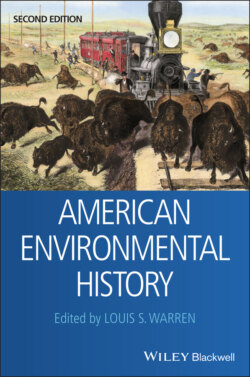Читать книгу American Environmental History - Группа авторов - Страница 31
A Way of Seeing
Оглавление… Traditional Koyukon people live in a world that watches, in a forest of eyes. A person moving through nature – however wild, remote, even desolate the place may be – is never truly alone. The surroundings are aware, sensate, personified. They feel. They can be offended. And they must, at every moment, be treated with proper respect. All things in nature have a special kind of life, something unknown to contemporary Euro-Americans, something powerful .…
Over a span of millennia, the Koyukon people and their ancestors have sustained themselves directly from their surroundings. The intimacy of their relationship to nature is far beyond our experience – the physical dependence and the intense emotional interplay with a world that cannot be directly altered to serve the needs of humanity. This close daily interaction and dependence upon an omnipotent natural universe has profound importance to the Koyukon people and provides a theme upon which their cultural lives converge.
Koyukon perceptions of nature are aligned on two interconnected levels. The first of these is empirical knowledge. The practical challenges of survival by hunting, fishing, and gathering require a deep objective understanding of the environment and the methods for utilizing its resources. In short, the Koyukon people are sophisticated natural historians, especially well versed in animal behavior and ecology.
But their perception of the natural environment extends beyond what Westerners define as the empirical level, into the realm of the spiritual. The Koyukon inherit an elaborate system of supernatural concepts for explaining and manipulating the environment. From this perspective the natural and supernatural worlds are inseparable, and environmental events are often caused or influenced by spiritual forces. Detailed explanations are provided for the origin of natural entities and for the causation of natural events (which seldom, if ever, take place purely by chance). Furthermore, behavior toward nature is governed by an array of supernaturally based rules that ensure the well-being of both humans and the environment.
It is important to understand that Koyukon beliefs about nature are as logical and consistent as they are powerful, but that they differ substantially from those prevailing in modern Western societies. Our own tradition envisions the universe as a system whose functioning can be explained through rationalistic and scientific means. The natural and supernatural worlds are clearly separated. Environmental events are caused by ongoing evolutionary and ecological processes, or else they happen purely by chance. Finally, modern Western cultures regulate human behavior toward nature and its resources primarily on the basis of practical rather than religious considerations.
For the traditional Koyukon Athapaskans, ideology is a fundamental element of subsistence, as important as the more tangible practicalities of harvesting and utilizing natural resources. Most interactions with natural entities are governed in some way by a moral code that maintains a proper spiritual balance between the human and nonhuman worlds. This is not an esoteric abstraction, but a matter of direct, daily concern to the Koyukon people. Failure to behave according to the dictates of this code can have an immediate impact on the violator’s health or success. And so, when Koyukon people carry out their subsistence activities they make many decisions on the basis of supernatural concerns. The world is ever aware.
